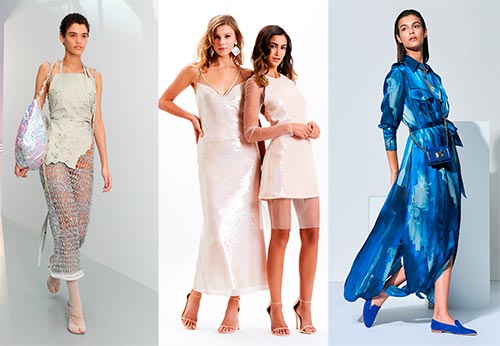Cosmetology
Silicone in cosmetics for face and hair - benefits and harms
Let's continue our study of the ingredients found in modern cosmetics. And today we will pay attention to silicone, the controversy about which does not subside. Many scientists-researchers in the field of chemistry and cosmetology do not recommend the use of products that contain silicones, others believe that ...
Silicone in cosmetics - advantages and benefits
However, let us first turn to its merits. Silicones are a group of polymers that are biologically compatible with the tissues of the human body. Therefore, they are used in medicine and in the production of cosmetics. In medicine, silicones are used to coat medical instruments and prostheses, and in the preparation of various healing ointments.
For a long time, silicone implants have been used for breast augmentation. But this is a slightly different topic. We're going to talk about cosmetics. In cosmetics, silicones are used in various products, making their texture more pleasant to the touch. These products soften the skin well. Silicones in cosmetics are designed to mask our imperfections on the skin.
Makeup using the productcontaining silicone, it turns out much better, because, thanks to the silicone, the texture is evenly distributed, fills in the unevenness of the skin, and you see your skin more perfect and well-groomed, wrinkles and pores are reduced. But this, as you understand, is only an external effect.
Silicones are added to shampoos, conditioners, and hair styling products. Thanks to them, the hair becomes smooth and shiny, and increases in volume. However, if a substance is not excreted from the body naturally, then it cannot be called a completely safe product.
And this is where those disadvantages of silicones begin, because of which disputes occur. There are different types of silicones - some are water-soluble and easy to wash off, so they are considered the best option for cosmetics. These silicones are most commonly found in shampoos and conditioners.
Others are water insoluble. They are used in decorative cosmetics. Thanks to such silicones, the durability of cosmetics and make-up also increases. Such products have a dense enveloping texture that allows you to form a protective film on the skin. But these silicones are not easily washed off the skin, and therefore tend to accumulate, and this is unfavorable for the skin.
Silicone does not penetrate the skin; it forms a film on the surface that retains moisture in it. It would seem that everything is fine - the skin is moisturized, there is a protective film. However, silicone not only retains moisture, but also sebum, as well as dirt and bacteria that form on the skin if cleansing is not enough.
The silicone film interferes with the regulation of natural processes on the skin, such as sweating, removing dead skin particles, normalizing temperature, etc. Since the hydration processes are impaired, this leads to the formation of acne, dryness, wrinkles, and dull skin color.
Silicone is a hydrophobic substance, that is, it does not interact with water, and therefore our skin, on which we apply the cream, seems to be wrapped under a film. If your morning starts with a silicone-based cleanser, the absorption of subsequent nutrients becomes less effective. Hence the conclusion - it is better to use cleaning agents without silicone.
The same can be said for our curls. Silicone, located on one side of the shampoos, prevents hair damage, covers the hair with a protective film, which makes it more alive and voluminous, shiny and well-groomed.On the other hand, silicone does not allow useful substances to penetrate the hair, which you want to strengthen the hair, to give it healthy nutrition. Hair will soon look dry and dull.
In the composition of cosmetics, silicones are designed to mask our imperfections on the skin, in the composition of shampoos - the same thing. But this is only an external effect, and temporary, and then deterioration sets in.
What to do to minimize harm?
There are several ways in which you can reduce or avoid the harmful effects of silicone. If you want health and beauty for your skin and hair, you must use products that do not contain silicone. Most often these are products with natural ingredients. In other words, it is necessary to take care of skin hydration, its elasticity, nutrition with the help of natural cosmetics. You can use natural homemade products. The former is often expensive or very expensive, the latter is not easy to prepare, which requires more time to take care of yourself.
Therefore, many of us follow the simplest path, buying the usual cosmetics, without looking at the list of products, but on the recommendation of friends or a seller.
You can go the other way - carefully look at the list of ingredients on jars, tubes and boxes. However, not everything is so simple here either. It is far from always possible to immediately find unwanted ingredients in the composition of the product. Firstly, you need to know their names, and secondly, the very small print makes it difficult. In modern cosmetics, silicones can be identified by the endings: "conol", "cone" and "siloxane".
But there are still obstacles. Manufacturers successfully encrypt them under professional terms. And more and more new modifications of silicones are constantly emerging, because inventions continue. And if today one ingredient, which is very necessary in the composition of the product, has established itself as unreliable among the consumer, it must be noticed by others without interrupting production, and not so expensive. And silicones are inexpensive ingredients.
In addition, you can not give up cosmetics with silicones, but simply pay more attention to cleansing, in which case silicone will bring more beauty than problems.
Why are cosmetic manufacturers not abandoning silicones? Silicones make the texture of cosmetic products more uniform, they can make the product more durable and plastic. Thanks to them, you feel that the texture of the cream is soft and velvety, does not leave unpleasant stickiness on the skin, and your skin looks more hydrated and beautiful.
In addition, silicones have a lower cost and a longer shelf life. All this cannot be said about natural ingredients, which have a high cost and shelf life is much lower.
And today, not everyone considers the harm of silicones to be a proven fact.
There are more and more specialists who believe that silicone-based products cannot be made. But most cosmetic products continue to contain silicones.
Make-up products that contain silicones.
1. Primer - a product that prepares the skin for make-up. Thanks to silicones, the primer does an excellent job of leveling the skin's relief. The silicones contained in it also increase the durability of the make-up.
2. Foundation hides skin irregularities, redness, freckles and age spots. Silicone creates a delicate texture in it, pleasant to the touch. The coating on the skin will be silky and soft.
3. Lipstick. A beautiful and even color distribution is also created thanks to silicones.
4. Mascara. The composition of the product, thanks to the silicone, envelops the eyelashes well, adding volume to them. The coating is quite dense.
And so, if you observe a positive effect from the effects of cosmetics with silicone, and are not going to change cosmetics in the near future, you must thoroughly cleanse the skin from silicones that clog pores, otherwise the remaining product will accumulate, and under such a "protective" film, skin renewal will be defective. Modern peels, hydrophilic oils and other cleansers will help you get rid of any build-up on your skin.
And one more consolation for those who use cosmetics with silicones. This is that their concentration in the composition of funds is minimal. After all, the cosmetics industry thinks not only about business, but also about women's health. The proportion of silicones from the composition of the entire product does not exceed 8%, which allows you to preserve all its advantages and minimizes possible harm.
If some of you are thinking and decided to use cosmetics with other ingredients that have moisturizing properties, then look for products containing ingredients such as aloe vera, oils - shea, avocado, jojoba, prickly pear oil ... Wax, which can be added to decorative cosmetics, silk proteins and keratin (in hair products).
Tell friends:
Comments and Reviews
Add a comment
Rating news
Shades of clothing that make women look younger
What shades of hair make women younger: rules and photos
Funny wedding dresses - photos and ideas
12 most expensive down jackets for the winter
How to look 25 at 40: tips from supermodels
Beautiful schoolgirls
Anti-aging haircuts and hairstyles for women
Fashionable skirts for autumn and winter
Fashionable women's trousers for the cold season
Fashionable and stylish sandals for summer 2020
Spring-summer 2021
 Fashionable dresses and tops with thin spaghetti straps
Fashionable dresses and tops with thin spaghetti straps
 Bandana tops: how to wear stylishly and beautifully
Bandana tops: how to wear stylishly and beautifully
 How to put together the perfect men's wardrobe for the summer
How to put together the perfect men's wardrobe for the summer
 Trendy shorts for spring-summer 2021
Trendy shorts for spring-summer 2021
 Fashionable skirts for spring-summer 2021: a guide to online shopping
Fashionable skirts for spring-summer 2021: a guide to online shopping
 The most fashionable dresses spring-summer 2021: styles and colors
The most fashionable dresses spring-summer 2021: styles and colors
 Fashionable total look 2021: image ideas and trends
Fashionable total look 2021: image ideas and trends





